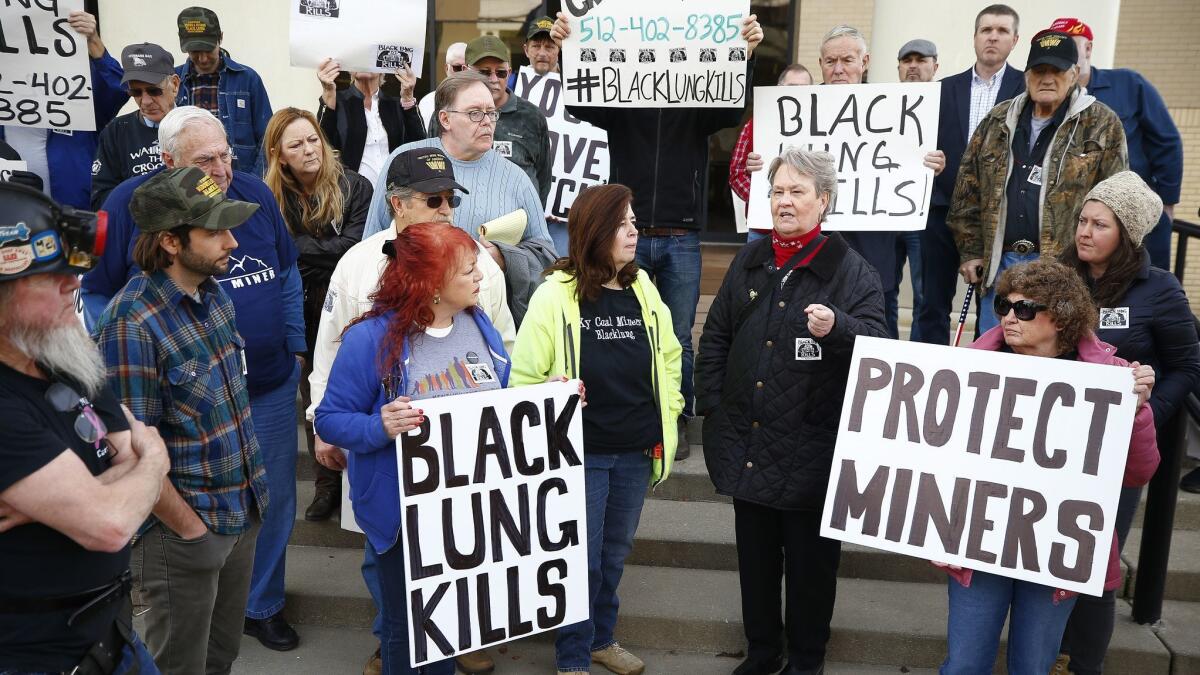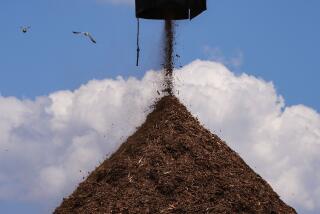Editorial: Congress should ensure that aid to black lung sufferers is there when they need it
- Share via

Although the future of American electricity production will center on renewable sources, such as solar and wind, coal still fuels the plants generating about 30% of the power that lights and cools our homes, runs factory machinery and keeps computers like the ones used to produce this editorial working. This coal-fired energy pathway begins, often, under the Appalachian Mountains, where generations of miners have hewed the black rock from subterranean seams.
It’s dangerous work, and not just because of rockfalls, explosions and methane leaks. The coal and silica dust kicked up in the process of cutting through coal and stone kills lung tissue in miners who breathe it in. And even as the nation’s reliance on coal has been necessarily declining — it is the worst of the fuel sources for releasing greenhouse gases — the rate of “black lung” diagnoses has increased.
And unless Congress acts, one of the few lines of assistance for miners suffering from the terminal condition could be significantly reduced.
Congress created the Black Lung Disability Trust Fund in 1977 to provide cash and medical benefits to coal miners (ranging from $650 to $1,300 per month) disabled by black lung disease — pneumoconiosis — whose former employers have gone bankrupt or are otherwise unavailable to provide support for employees who contracted illnesses on the job. The law required mining companies to pay a per-ton tax on all coal produced for domestic production, but miners’ claims outpaced revenues almost from the start, leading Congress in 1986 to increase the tax to $1.10 per ton for coal mined underground and 55 cents per ton for coal from surface mines.
The increase hasn’t been enough to lift the fund out of the red, even after Congress forgave $6.5 billion of the fund’s debt in 2008. Revenues continued to lag as the demand for coal dropped, pushing the fund’s debt to $4.3 billion. Making matters worse, the 2008 measure also contained a sunset provision that will drop the coal tax rates by more than half at the end of this year, which will drive the fund even deeper into debt as it supports 25,700 miners and their dependents.
Enter the Fray: First takes on the news of the minute from L.A. Times Opinion »
President Trump campaigned on the (misguided) promise that he would reinvigorate the coal industry, and as president he has traveled often for rallies in the coal-mining districts of West Virginia, Ohio and Pennsylvania, all states he won in 2016 and that could be key to his reelection bid. Yet Trump has done virtually nothing to address the fiscal cliff the trust fund faces. Neither, for that matter, has Senate Majority Leader Mitch McConnell (R-Kentucky), whose own constituents include thousands of people who have relied on the coal industry for their livelihoods.
The crisis facing the trust fund needs a better fix than just continuing the coal taxes which, according to a Government Accountability Office report in May, would be insufficient to bring the trust fund to solvency. Demand for coal domestically is decreasing, and we hope it continues to do so as the nation moves more and more to renewable energy sources. Fossil fuels in general and coal in particular propelled the rise of American industry and helped make this a wealthy nation, but coal has also poisoned our air and water and the lungs of the miners themselves.
At some point, the fund’s shortfall will be so great that it could become insolvent, leading to cuts in benefits or worse. And even if it doesn’t, the fund’s financial troubles could shift more responsibility for the miners’ care to the taxpayers, when it should remain with the companies that profited from the mines — and that, according to recent reporting by National Public Radio and PBS’ “Frontline,” failed to properly safeguard their workers once the dangers of coal dust and silica (generated from cutting through quartz and other hard rock to reach coal seams) became clear.
But with more and more coal operators falling into bankruptcy, and coal production expected to continue to decline over the next two decades, the burden of caring for increasing numbers of disabled miners will exceed the industry’s capacity to meet it. Congress should extend and increase the per-ton coal tax to shore up the trust fund and send yet another market signal that the future will not belong to coal. And the rest of us need to be prepared, as the coal industry continues its decline, to shoulder responsibility for the workers who sacrificed their health to keep our lights on.
Follow the Opinion section on Twitter @latimesopinion or Facebook.
More to Read
A cure for the common opinion
Get thought-provoking perspectives with our weekly newsletter.
You may occasionally receive promotional content from the Los Angeles Times.









